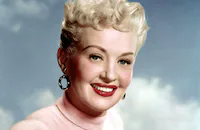Hold 'Em Jail

Brief Synopsis
Cast & Crew
Norman Taurog
Bert Wheeler
Robert Woolsey
Edna May Oliver
Robert Armstrong
Rosco Ates
Film Details
Technical Specs

Synopsis
When Elmer Jones, the warden of Bidemore State Penitentiary, receives a goading letter from Charles Clark, the warden of Lynwood Penitentiary, about an upcoming prison football match, he orders Butch, his coach, to find better "recruits" for the team. Butch telephones Mike Maloney, the president of the prison "alumni association," and solicits the gangster's help in finding players. At the same time, novelty salesmen Curly Harris and Spider Robbins sneak into Maloney's nightclub office and, mistaking Elmer for Maloney, unleash their sales pitch on the harried warden. After Elmer leaves in a dazed huff, Curly and Spider meet Maloney and his cohort Whitey and try to pass themselves off as expert football players. By substituting their toy guns with real weapons, Whitey tricks the salesmen into holding up the nightclub and getting themselves arrested. Spider and Curly are sent to Elmer's prison and ingratiate themselves with Elmer's daughter Barbara and his spinster sister Violet. After the duo, who have been assigned to work in the blacksmith's shop, unwittingly aid a convict in an escape attempt, Elmer threatens to toss them into solitary confinement but instead is fooled into making them trustees by Violet. Under Elmer's nose, Spider romances Violet, while Curly flirts with Barbara, who makes a nine o'clock date with him in the prison courtyard. Unknown to Curly, a group of prisoners are planning an escape that night, and when Curly inadvertently mutters the time and place of his date to another convict, the convict assumes that Curly is "passing the word" about the breakout. To Curly's horror, his date is thwarted by gunfire from the guards, who have been tipped off about the escape, and as punishment, he is sent to toil on the rock pile by Elmer. When Elmer learns that his star quarterback has been pardoned by the governor, however, he is persuaded by Spider that Curly is his only hope to win the upcoming game with Lynwood. During the chaotic match, which is dominated by Curly and Spider's unusual style of play, the duo discovers Whitey on the Lynwood bench. Bent on revenge, Curly and Spider steal the referee's bottle of chloroform and, by dousing their towels with the chemical, knock out all of the players on the field and force Whitey into the game. While Whitey is under the chloroform's influence, Curly and Spider make him sign a confession and then score the game-winning touchdown. Vindicated by Whitey's confession, Curly kisses Barbara, while Spider embraces Violet.

Director

Norman Taurog
Cast

Bert Wheeler

Robert Woolsey

Edna May Oliver

Robert Armstrong

Rosco Ates

Edgar Kennedy

Betty Grable

Warren Hymer
Paul Hurst
G. Pat Collins
Stanley Blystone
Jed Prouty
Spencer Charters
John Sheehan
Crew
Fred Bentley
Elwood Bredell
Harry Joe Brown
Carroll Clark
James Daly
Walter Deleon
Edward Henderson
Lew Lipton
Hugh Mcdowell Jr.
John P. Medbury
S. J. Perelman
Al Ray
Arthur Roberts
Mark Sandrich
Al Scheving
David O. Selznick
Leonard Smith
Max Steiner
Eddie Welch
Tim Whelan

Film Details
Technical Specs

Articles
Hold 'Em Jail
By Glenn Erickson

Hold 'Em Jail
Quotes
Helping a prisoner to escape? I'll put you on the rock pile for this!- Kravette
If you do, we'll throw rocks at you!- Spider Robbins
That's funny - I can't seem to hit that top note.- Violet Jones
Perhaps it's just as well. Where did you learn to sing, anyway?- Spider Robbins
I spent four years in Paris. Of course, I'm not a virtuoso.- Violet Jones
Not after four years in Paris, no.- Spider Robbins
I trust we're both talking about the same thing?- Violet Jones
Trivia
Notes
All of the reviews credit Mark Sandrich, not Eddie Welch, as the third screenwriter. Sandrich is not given screen credit, however. A May 1932 Film Daily news item adds Marshall Duffield, Ernie Pinckert, Dink Templeton, Ward Bond, Harold Schlickenmayer, Jim Musick, Nate Barrager, Roy Baker and Dutch Hendrian to the cast, noting that they were all "All-American football stars." Their participation in the final film has not been confirmed. According to modern sources, this film lost $55,000 at the box office.














